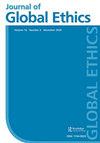Moving beyond settlement: on the need for normative reflection on the global management of movement through data
Q2 Arts and Humanities
引用次数: 0
Abstract
Normative theorists of migration are beginning to shift their focus away from an earlier obsession with whether the ‘liberal' or ‘legitimate’ state should have a right to exclude, and toward evaluation of how states engage in immigration control. However, with some notable exceptions – such as work of Rebecca Buxton, David Owen, Serena Parekh, and Alex Sager – this work tends not to focus on the global coordination of such control, and is still largely concerned with issues of membership. In this paper I aim to show the value of shifting normative attention to the fundamentally interdependent nature of state control of migration, and the management of all forms of movement – not just settlement. This global management is greatly facilitated by the rapid digitisation of border controls. As such, I outline three aspects of the way digital border controls work – profiling, biometric identification, and the data sharing practices upon which they rest – and highlight ethical challenges of accountability, consent and the reach of the state, and entrenching global inequalities in access to movement. Ultimately, I hope to show that the globally interconnected nature of migration management is a combination of practices that normative theorists of migration should turn their attention to.超越解决:关于通过数据对流动的全球管理进行规范性反思的必要性
移民的规范理论家开始将他们的注意力从早期对“自由”或“合法”国家是否应该有排他权的痴迷转移到对国家如何参与移民控制的评估上。然而,除了一些值得注意的例外——比如Rebecca Buxton、David Owen、Serena Parekh和Alex Sager的工作——这项工作往往不关注这种控制的全球协调,而仍然主要关注成员问题。在本文中,我的目的是展示将规范性注意力转移到国家控制移民和管理所有形式的流动(而不仅仅是定居)的基本相互依存性质上的价值。边境管制的快速数字化极大地促进了这种全球管理。因此,我概述了数字边境控制工作方式的三个方面——特征分析、生物识别和数据共享实践——并强调了问责制、同意和国家范围的道德挑战,以及在流动方面根深蒂固的全球不平等。最后,我希望表明,移民管理的全球互联本质是移民规范理论家应该关注的实践组合。
本文章由计算机程序翻译,如有差异,请以英文原文为准。
求助全文
约1分钟内获得全文
求助全文

 求助内容:
求助内容: 应助结果提醒方式:
应助结果提醒方式:


